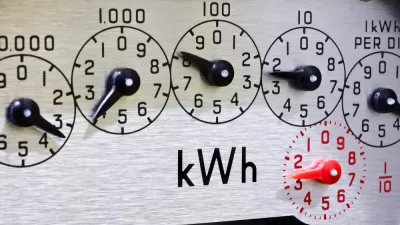Say what you will about growing corn for fuel, and there are many criticisms even coming from the environmental community, corn ethanol has its benefits, and one of the most important is reducing oil's stranglehold on America's transportaton fuels.
You might not know it, but "(t)oday, nearly every gallon of U.S. gasoline contains 10 percent ethanol," writes energy reporter Elizabeth Douglass, and that is largley due to a 2005 law that created the federal Renewable Fuel Standard (RFS).
"The American oil industry could be on the verge of winning its war on the federal Renewable Fuel Standard (RFS), as the Obama administration weighs changes that could severely undermine the nation's most successful—and most divisive—effort to cut crude oil consumption in the nation's cars,"
(F)ederal regulators in November proposed lowering the 2014 usage requirements for the total volume of renewable fuel and for advanced biofuels. Last month, regulators said they may also grant oil industry requests for waivers on their biofuel obligations for 2014 as well as for fiscal 2013, which ends in June.
First, some background: The RFS program was created under the Energy Policy Act (EPAct) of 2005 and administered by the EPA "to ensure that transportation fuel sold in the United States contains a minimum volume of renewable fuel" according to the RFS webpage. "EPA will rule on the proposed biofuel reductions and the oil industry waivers if the comming months," adds Douglas.
From an environmental perspective, Douglas writes that "now that more efficient ethanol plants are in place and U.S. refiners are making more fuel from Canada's dirtier tar sands oil, it's clear that biofuels also generate less greenhouse gas emissions than gasoline—even in the case of corn ethanol."
Douglas points to an interesting source to understand an issue central to the Big Oil vs. Big Corn conflict: "oil dependence". Rather than tackling the issue by reducing imports (by increasing domestic production and/or even reducing consumption), the U.S. Energy Security Council, which Douglas describes as "a group of business leaders and former high-ranking government officials that works to reduce dependence on oil," asserts that "the real problem is oil's status as a strategic commodity which stems from its virtual monopoly over transportation fuel," according to "the issue" page in its website.
The environmental community appears reluctant to step into the battle, but I sense them leaning toward maintaining the current Renewable Fuels Standard.
The Natural Resources Defense Council, not a fan of corn ethanol, is hopeful that the RFS fight leads to changes that strengthen and accelerate the shift away from petroleum-based fuels.
Adds the Sierra Club's Jesse-Prentice Dunn, formerly with their Green Transportation Campaign, in an email: "On one hand, [RFS] is one of the only laws passed by Congress that judges fuels on a lifecycle GHG basis. On the other, it grandfathered in billions of gallons of corn ethanol and the volumes of advanced biofuels haven't come online as quickly as we hoped."
However, it looks like Big Oil may win this fight. Douglas mentions that even "Sen. Dianne Feinstein (D-Calif.) recently weighed in with a bill that would strip corn-derived ethanol from the RFS." However, Feinstein wrote "in support of advanced biofuel incentives that move beyond corn-based ethanol," reflecting a position of many environmentalists wary of corn ethanol and supportive of cellulosic biofuels.
FULL STORY: The Oil Industry's Fight to Kill Renewable Fuels—and Why It May Win

Alabama: Trump Terminates Settlements for Black Communities Harmed By Raw Sewage
Trump deemed the landmark civil rights agreement “illegal DEI and environmental justice policy.”

Study: Maui’s Plan to Convert Vacation Rentals to Long-Term Housing Could Cause Nearly $1 Billion Economic Loss
The plan would reduce visitor accommodation by 25% resulting in 1,900 jobs lost.

Planetizen Federal Action Tracker
A weekly monitor of how Trump’s orders and actions are impacting planners and planning in America.

Wind Energy on the Rise Despite Federal Policy Reversal
The Trump administration is revoking federal support for renewable energy, but demand for new projects continues unabated.

Passengers Flock to Caltrain After Electrification
The new electric trains are running faster and more reliably, leading to strong ridership growth on the Bay Area rail system.

Texas Churches Rally Behind ‘Yes in God’s Back Yard’ Legislation
Religious leaders want the state to reduce zoning regulations to streamline leasing church-owned land to housing developers.
Urban Design for Planners 1: Software Tools
This six-course series explores essential urban design concepts using open source software and equips planners with the tools they need to participate fully in the urban design process.
Planning for Universal Design
Learn the tools for implementing Universal Design in planning regulations.
Caltrans
Smith Gee Studio
Institute for Housing and Urban Development Studies (IHS)
City of Grandview
Harvard GSD Executive Education
Toledo-Lucas County Plan Commissions
Salt Lake City
NYU Wagner Graduate School of Public Service




























